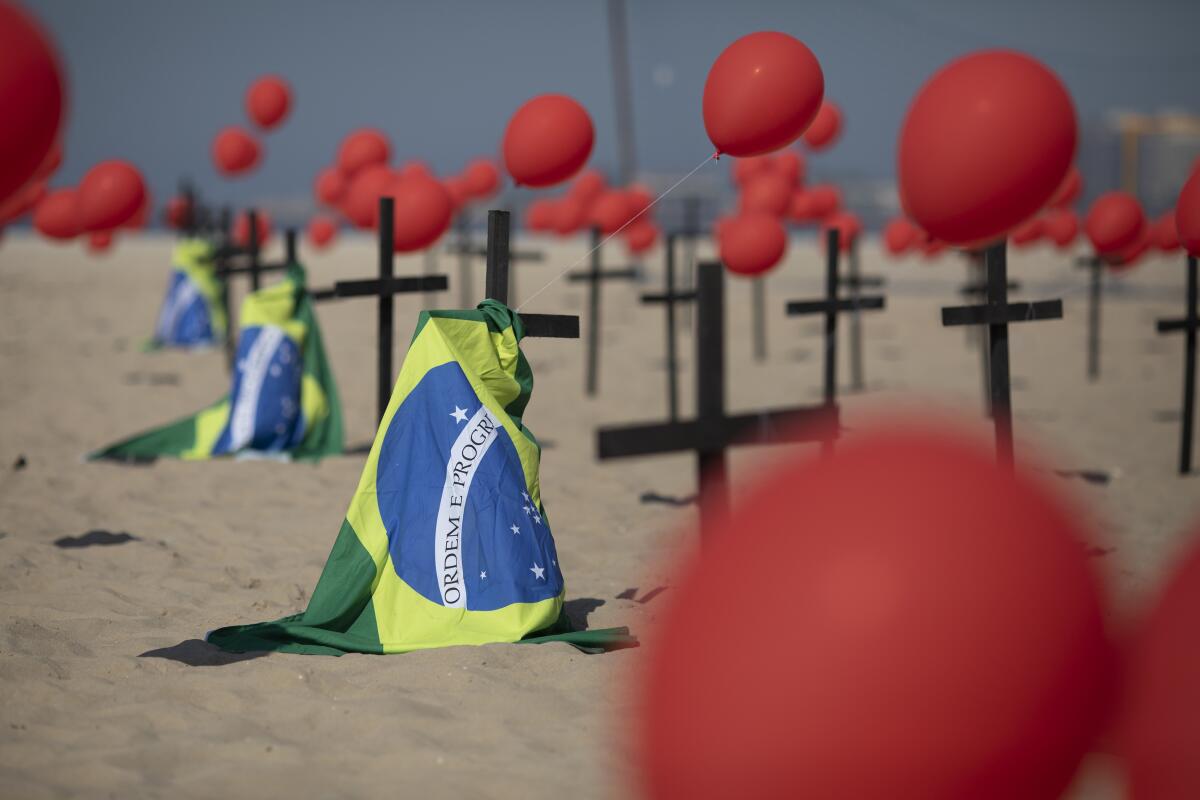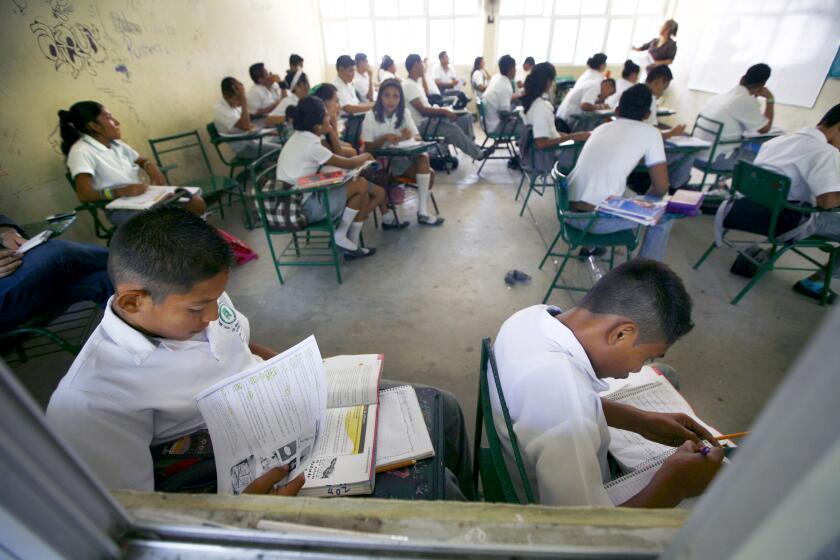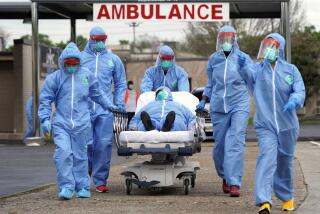Brazil marks 100,000 deaths from COVID-19

- Share via
RIO DE JANEIRO — Brazil surpassed 100,000 deaths from COVID-19 on Saturday night, and five months after the first reported case, the country has not shown signs of crushing the disease.
The nation of 210 million people has been reporting an average of more than 1,000 daily deaths from the pandemic since late May and reported 905 for the latest 24-hour period.
The Health Ministry said there had been a total of 3,012,412 confirmed infections with the new coronavirus — death and infection tolls second only to the United States. And, as in many nations, experts believe that both numbers are severe undercounts because of insufficient testing.
In a tribute to COVID-19 victims Saturday morning, the nongovernmental group Rio de Paz placed crosses on the sand on the famed Copacabana beach and released 1,000 red balloons into the sky.
“It’s very sad. Those 100,000 represent various families, friends, parents, children,” said Marcio do Nascimento Silva, a 56-year-old taxi driver who lost his children in the pandemic and joined the tribute.
“We reach that mark [100,000] and many people seem to not see it, both among the government and our people. They are not just numbers but people. Death became normal,” Silva said.
Italy has eased out of its strict coronavirus lockdown and has returned to a semblance of normality without -- so far -- a major, secondary flare-up.
President Jair Bolsonaro — who himself reported being infected — has been a consistent skeptic about the impact of the disease and an advocate of lifting restrictions on the economy that had been imposed by state governors trying to combat it. He has frequently mingled in crowds, sometimes without a mask.
On the day that Brazil reached more than 100,000 deaths, the federal government’s communication secretariat confronted criticism from former Justice Minister Sergio Moro on social media for the management of the pandemic.
“There are many numbers that deserve to be disclosed: — ALMOST 3 MILLION LIVES SAVED OR IN RECOVERY — ONE OF THE LOWEST DEATHS PER MILLION AMONG LARGE NATIONS,” said the secretariat’s official account on Twitter, sharing Moros’ tweet. Bolsonaro answered the tweet with an emoji of shaking hands.
Experts have complained of a lack of national coordination under Bolsonaro and scattershot responses by city and state governments, with some reopening earlier than health experts recommended.
“Administrative incompetence ruined our chance to have a good response to COVID,” said Miguel Lago, executive director of Brazil’s Institute for Health Policy Studies, which advises public health officials.
Brazil is facing the pandemic with an interim health minister, Eduardo Pazuello, an army general who made his career in logistics. Two earlier health ministers, both physicians, exited over differences with Bolsonaro about social distance measures and the use of hydroxychloroquine, an antimalarial drug promoted by the president but which most studies have found to be ineffective against COVID-19, and perhaps even dangerous.
With schools closed indefinitely because of the coronavirus, Mexico’s 30 million students will receive their education over network television.
Bolsonaro, who has called COVID-19 a “little flu,” says he recovered from his own infection thanks to that drug.
Many of Brazil’s 27 states have begun to reopen shops and restaurants, though responses have differed, as has the strain on the health system. Although Brasilia, the capital, has recorded almost 80% occupancy of its ICU beds, Rio de Janeiro’s occupation rate is now down to less than 30%.
In Rio, shopping malls and restaurants have already opened and people have returned to the beaches.
“The situation is very comfortable and we don’t understand why it is happening. Perhaps the infection rate was much higher than what was reported at the beginning of the pandemic and many of those on the street are immune,” speculated Graccho Alvim, director of the state’s association of hospitals.
Viviane Melo da Silva, 47, lost her mother, Esther Melo da Silva, in the Amazonas state capital of Manaus on April 9. The mother reported having a cold, and a few days later started having problems breathing. She died after five days in a public hospital.
“I still don’t accept her death, not yet,” said Da Silva, crying, and expressing regret the family had been unable to hold a wake for her mother.
“The government was saying that it was a ‘little flu.’ It did not care. It was not worried with that and that’s what happened: Innocent people died because of the negligence and the lack of preparation from the government,” she added.
Nazare Rosa de Paula, 67, said many people remain indifferent to the virus despite so many deaths. She said her husband, Geraldo, a 70-year-old retired bus driver, would wear a mask to go to the supermarket in Rio de Janeiro but never believed he would be infected.
In April he got what seemed to be just a flu. After his health worsened for eight days, he was diagnosed with COVID-19. He died April 28.
“It was fast. There was not time to do anything, and it surprised a lot of people,” De Paula said.
They had been together for 43 years. “Only the feeling of missing him is left. People said that with time [it will get better], but for me, it will not end, it won’t.”
More to Read
Sign up for Essential California
The most important California stories and recommendations in your inbox every morning.
You may occasionally receive promotional content from the Los Angeles Times.











